UK Probing Islamic Center Linked To Iran

The UK Charity Commission has begun investigating an Iran-linked British foundation, which has hosted hardline Islamic clerics and paramilitary figures.

The UK Charity Commission has begun investigating an Iran-linked British foundation, which has hosted hardline Islamic clerics and paramilitary figures.
According to The Sunday Times, the watchdog, which regulates registered charities in UK, opened a compliance case into the Al-Tawheed Charitable Trust (TUCF), located in a repurposed Methodist church in Hammersmith, west London, which promotes Islamic Republic’s regime propaganda among Shia Muslim youth in the UK. The TUCF owns and operates the Kanoon Towhid and a student association.
The center claims to “relieve poverty and sickness of persons who profess the Islamic religion in the UK” but it mainly glorifies Ruhollah Khomeini, the founder and first Supreme Leader of the Islamic Republic who ruled until his death in 1989, and hosts events featuring figures affiliated with the regime.
On January 5, 2020, it hosted a packed event celebrating Qassem Soleimani, the commander of the IRGC’s Quds Force, an extraterritorial arm of the Revolutionary Guard, which oversees clandestine operations and supports terrorist groups such as Hezbollah. He had been killed in a US airstrike 48 hours earlier. The trust’s literature described him as a “great martyr”.
Several other events were held in the center with representatives of the regime delivering lectures, such as Seyyed Hashem Mousavi, a charity trustee described as the UK representative of Ali Khamenei.
The Jewish Chronicle reported that the center hosted an event last month in which an imam praised “martyrs” of the “axis of resistance” -- an Islamic Republic term meaning Tehran-backed regional militias who are “the greatest threat to the Zionists”.The Chronicle also linked the center to virtual and in-person talks by members of the IRGC.
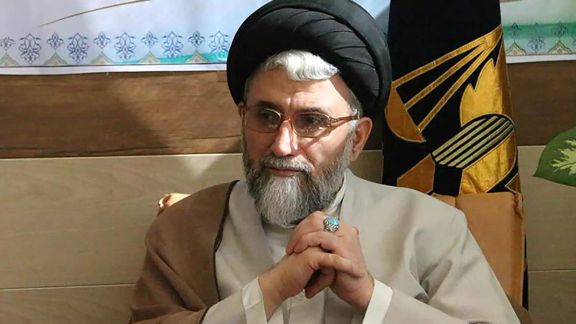
Iran’s minister of intelligence Esmail Khatib said Sunday that secret services are holding “spies from Sweden, France and Britain,” referring to some Western hostages.
Without providing names or details about the detainees, the intelligence minister even claimed that despite foreign pressures some of the “spies have been executed.”
Iran executed Iranian-Swedish political activist and former leader of the Arab Struggle Movement for the Liberation of Ahwaz (ASMLA) Habib Chaab (Asyud) in May.
In January, Iran executed British-Iranian national Alireza Akbari, after sentencing the former Iranian deputy defense minister to death on charges of spying for Britain.
Khatib, who is a hardliner cleric, was addressing the 24th assembly of senior Revolutionary Guard officers in Tehran, where he praised Iran’s multiple intelligence services for working together to thwart “enemy conspiracies” and domestic threats.
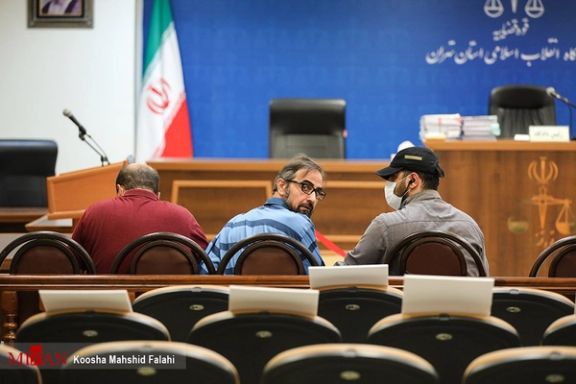
Khatib reiterated the regime’s ideological precept that “the enemy” continues to plot against the Islamic Republic, which has become a “global power.” He claimed that “50 intelligence services” around the world have set up “Iran desks” to be able to confront “a new global power.”
The term “enemy” is a favorite word used by Iran’s ruler Ali Khamenei to refer to the United States, Israel and their allies and partners, but Khatib did not elaborate about who these 50 adversaries around the world are.
Although Iran has released several European high-profile hostages this year, including French and Belgian prisoners held on spying charges, it is not clear how many more are left behind.
French Foreign Minister Catherine Colonna, who spoke in May after the release of two French hostages, said more work is needed “because there are, unfortunately, too many who are detained without reason in Iran.” Apparently, four French citizens and numerous other Europeans remain incarcerated in Iran.
While intelligence minister Khatib boasted about holding European “spies” he did not mention the five American hostages who were released into house arrest earlier this month after a deal with the Biden administration to unblock $6 billion of Iran’s money in South Korea.
The deal has triggered a lot of criticism in the United States, where politicians and some analysts have voiced fear that essentially paying $1.2 billion per hostage will embolden the Islamic Republic and other adversaries to take Americans hostage. Iranian hardliners certainly see the deal as ransom payment by the United States.
A firebrand senior ayatollah, Ahmad Alamolhoda on Friday called the release of Iran’s frozen funds by the US “a humiliation” and a “ransom” in exchange for “their spies.” The cleric is close to Khamenei and is the father-in-law of President Ebrahim Raisi.
Khatib also reiterated that “the enemy’s” aim is to destabilize Iran and reduce participation in the upcoming parliamentary elections in March. The regime has blamed anti-government protests on US and Israeli plots, while it killed more than 500 civilians, injured thousands and has arrested around 22,000 since last September.
Regime politicians and many analysts in Iran believe that voter turnout will be low in March, simply because hardliners prevented other regime loyalists to run both in the 2020 parliamentary and in the 2021 presidential elections. People see no real choice and are deeply angered by the current economic and political crises. They do not believe that Khamenei will change his Anti-West foreign policy and sanctions will continue to increase hardships they face.
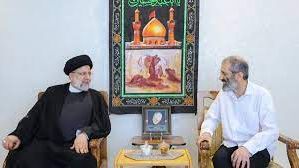
Iran's President Ebrahim Raisi has met with convicted terrorist Assadollah Assadi, who was released from Belgium in May in exchange for a Belgian hostage in Tehran.
A court in Belgium had sentenced Assadi to a 20-year prison term after being found guilty of involvement in a plot to orchestrate an attack on an Iranian opposition event in 2018 near Paris. However, he was released from prison and returned to Iran on May 26 as part of a mediated exchange carried out with the assistance of Oman.
In return for Assadi's release, Iran released Belgian aid worker Olivier Vandecasteele, who had been incarcerated in Tehran for nearly 15 months.
Despite the long trial in Belgium that led to Assadi's conviction, Iran claimed that he was innocent and treated him as a hero upon his return. Assadi was a diplomat in Iran's embassy in Austria and according to evidence submitted during his trial, he used his diplomatic status as a cover to organize the bomb plot.
The president's office reported on Saturday that during the meeting on Friday, President Raisi said, "The proponents of human rights have once again demonstrated their disregard for established legal frameworks." He further claimed that these countries “had violated international norms and principles” by undermining the diplomatic immunity of the Iranian diplomat.
The prisoner exchange marked the culmination of extensive political debates in Belgium, particularly within the nation's parliament. In January, Vandecasteele, aged 42, had been sentenced to 40 years in prison and 74 lashes on charges of "espionage," a verdict that both his family and Belgian authorities criticized as "unfair."
Since May, Oman-mediated negotiations have led to the release of six European citizens held in Iran, while several are still held hostage.
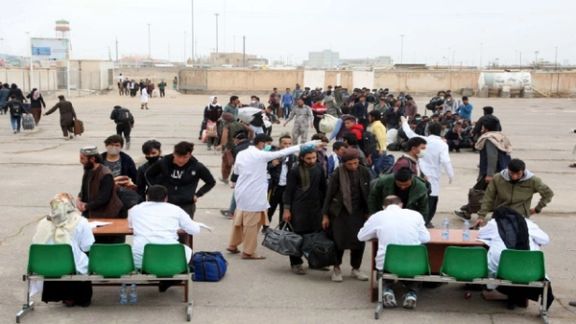
A conservative Iranian newspaper has issued a warning about potential security repercussions due to the increasing influx of Afghan and other migrants into Iran.
The editorial in Jomhuriye Eslami (Isalmic Republic) daily highlights the urgency for political leaders and intelligence officials to address the escalating issue of "foreign national" entering the country.
The term foreign nationals was used to describe those involved in the attack on the Shahcheragh shrine in Shiraz August 13, calling for the attention of political and security authorities, added the daily.
The editorial notes that while the primary perpetrator holds Tajik citizenship, other detainees have different nationalities, prompting reflection on the presence of foreign nationals in Iran and the mounting adverse effects in society. Afghans are the largest group of migrants arriving in Iran by thousands daily.
The article emphasized the need “to uphold legal frameworks and rigorous oversight concerning foreign nationals' presence.” Key considerations include robust monitoring to prevent criminal activities, which significantly impact national security, the daily noted.
Drawing insights from recent events, the article underscored several points. It questioned how foreign nationals conducted an attack exposing a lack of oversight that raises concerns about more serious future crimes. It also highlighted the risk of adversaries using foreign nationals to destabilize Iran.
Meanwhile, former chairman of Iran's national security and foreign policy committee, Heshmatollah Falahatpisheh, underscores the potential security challenge of Afghan migrants. With approximately 10,000 arriving daily, Falahatpisheh highlights potential systemic facilitation and the need for robust oversight.
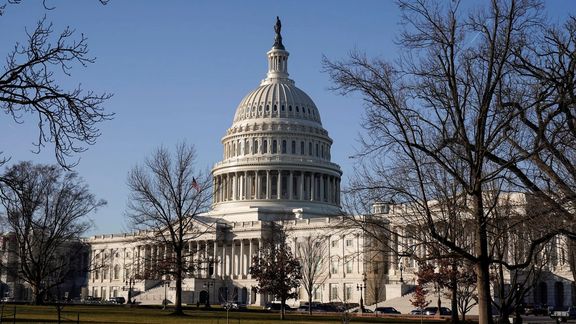
A group of 26 US Republican senators sent a letter to President Joe Biden Friday demanding answers on its controversial money for hostages deal with Iran.
US Senator Jim Risch (R-Idaho), ranking member of the Senate Foreign Relations Committee, Lindsey Graham (R-SC), Tim Scott (R-R-SC), Tom Cotton (R-Ark) and Bill Hagerty (R-Tenn.) were among the signatories of the letter to the White House.
Earlier this month It was announced that the Islamic Republic of Iran released five US dual nationals held in prison on trumped-up charges have been released into house arrest pending Iran receiving around $6 billion of its frozen funds in South Korea. The White House has to waive its sanctions to allow Seoul to free up the money.
Immediately, lawmakers, former officials and many Iranian Americans began to voice strong criticism of the White House decision, that would provide a financial relief to the Iranian regime while it engages in systematic human rights violations and destabilizing activities against other countries.
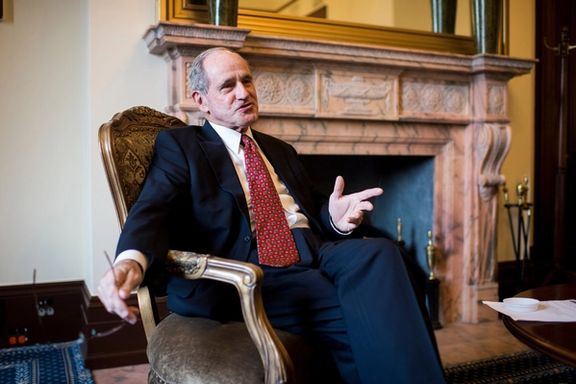
The 26 senators wrote to President Biden that a $400 million cash payment by the Obama administration in 2016 to free hostages held by Iran set a dangerous precedent of more hostage-taking, and “Seven years later, the current administration is providing a ransom payment worth at least fifteen times that amount to the world’s largest state sponsor of terror, in yet another violation of the United States’ long-standing ‘no concessions’ policy.”
Many media reports have indicated that the administration in effect has released more money, with allowing Iraq to free up to $11 billion held by its banks, while the reason for that decision is being kept secret by the administration. Many sources are reporting that the US is holding secret talks with Iran to reach an informal and unwritten deal to put a cap on its uranium enrichment, and the hostage release deal is just the first step.
The administration so far has denied any nuclear deal and insists that the unblocked funds can only be used by Iran to import food and medicine. However, the money will go to Iranian bank accounts in Qatar, a close Iranian ally in euros and it is not clear how much leverage the United States will have on oversee the disbursement of the funds.
The senators who signed the letter stated, “We are also worried that your administration is attempting to sidestep Congress and pursue other pathways to financially compensate Iran in an attempt to renegotiate a successor to the ill-fated 2015 nuclear deal. Any agreement with the Iranian regime that entails financial reward for malign behavior is wholly unacceptable.”
They went on to ask the administration if the release of the assets from South Korea violates existing US sanctions. “Will the President issue a waiver and required report to Congress consistent with Section 1245 of the FY2012 National Defense Authorization Act?”
They also argued that the released cash, even if not delivered directly to Iran, is fungible and asked, “How can your departments guarantee that the funds will only be used for humanitarian purposes and will not free up additional resources that the Iranian regime can use to support terrorist networks and weapons proliferation, or increase its nuclear enrichment activities?”
The senators, representing more than half of all Republicans in the Senate, also asked several other questions about other possible secret deals with Iran.
While no Democrats joined co-sponsored the letter, Senator Bob Menendez (D-NJ) fired his own salvo, regarding the case of Rob Malley, Biden’s former Iran envoy who has been apparently fired and is under investigation by the FBI on possible breach of security rules. Menendez said that he is working on legislation to mandate the State Department “to be transparent when there are security issues with senior officials.”
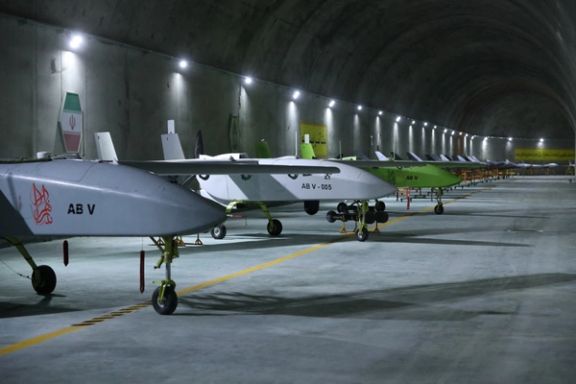
The Washington Post has revealed that Russian drone engineers had to take shelter in a Tehran hotel after an alleged Mossad strike on Iran's drone facility.
The newspaper obtained leaked documents that reveal Russian industrial experts were in Tehran for a joint attack drone operation and were forced to take shelter in their hotel after a reported attack on a Shahed-136 UAV production facility in Esfahan, central Iran.
The Iranian authorities were reportedly concerned about the possibility of additional strikes on drone facilities in Tehran, which the Russian experts were scheduled to visit.
The leaked materials, originating from a source within a specialized Russian facility working on drone production, showcased a project aiming to manufacture 6,000 drones by the summer of 2025.
In June, the US intelligence community revealed that Iran was assisting Russia in establishing a drone manufacturing plant in Russia's Alabuga special economic zone, raising concerns about potential military applications.
While the project encountered delays and difficulties, including staffing shortages in key areas of drone development, experts suggest that Russia is making strides toward enhancing its drone capabilities beyond those of the Shahed-136.
Despite the revelations, neither the Russian government, Iran's UN mission, nor the Alabuga facility responded to requests for comment. The United States and its allies have implemented measures to curtail the transfer of drone-related components to Russia and Iran.